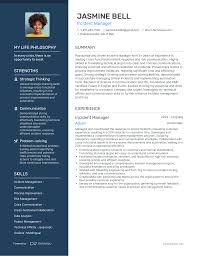Cyber Incident Response And Recovery Manager Resume, In the ever-evolving landscape of cybersecurity, the role of a Cyber Incident Response and Recovery Manager has become critical for organizations looking to safeguard their digital assets. With the rise of cyber threats and data breaches, companies are actively seeking professionals who can effectively manage incident response strategies and recovery processes. A well-crafted resume is essential for standing out in this competitive field. Here are key elements to include in your Cyber Incident Response and Recovery Manager resume to enhance your chances of landing an interview.
1. Contact Information
Start with your full name, phone number, email address, and LinkedIn profile (if applicable). Ensure that this information is clear and easy to find.
2. Professional Summary
A compelling professional summary should be at the top of your resume. This section should highlight your years of experience, areas of expertise, and what you bring to the table. For example:
“Results-driven Cyber Incident Response and Recovery Manager with over 8 years of experience in leading incident response teams and developing robust recovery strategies. Proven track record in minimizing the impact of cyber incidents through effective risk management and crisis response.”
3. Core Competencies
Include a list of relevant skills that align with the requirements of the job. Use keywords such as:
- Incident Response Management
- Cybersecurity Frameworks (NIST, ISO 27001)
- Risk Assessment and Mitigation
- Disaster Recovery Planning
- Threat Intelligence Analysis
- Team Leadership and Training
4. Professional Experience
Detail your work history in reverse chronological order, emphasizing roles related to incident response and recovery. For each position, include the job title, company name, location, and dates of employment. Use bullet points to outline your responsibilities and achievements, focusing on quantifiable results. For example:
Cyber Incident Response Manager
XYZ Corp, New York, NY
June 2019 – Present
- Led a team of 10 in the development and execution of incident response plans, resulting in a 30% reduction in incident resolution time.
- Conducted regular training sessions for staff on cybersecurity best practices, increasing team awareness and compliance by 40%.
- Collaborated with IT and legal departments to ensure seamless recovery operations post-incident, restoring critical systems within 24 hours.
5. Education
List your educational background, including degrees earned, institutions attended, and graduation dates. Highlight any certifications relevant to cybersecurity, such as:
- Certified Information Systems Security Professional (CISSP)
- Certified Incident Handler (GCIH)
- Certified Information Security Manager (CISM)
6. Certifications and Professional Development
In addition to your formal education, include any relevant certifications or professional development courses you’ve completed. These can showcase your commitment to staying current in the field and your expertise in specific areas of incident response.
7. Technical Skills
Highlight technical skills that are crucial for the role. This could include:
- Knowledge of forensic analysis tools (e.g., EnCase, FTK)
- Proficiency in SIEM tools (e.g., Splunk, LogRhythm)
- Familiarity with malware analysis techniques
8. Professional Affiliations
If you belong to any professional organizations related to cybersecurity, such as ISACA or (ISC)², mention them. This can demonstrate your engagement with the broader cybersecurity community.
9. Achievements and Awards
If applicable, include any awards or recognitions you’ve received for your work in cybersecurity. This could be a valuable addition that sets you apart from other candidates.
Conclusion
A Cyber Incident Response and Recovery Manager resume should reflect not only your technical expertise but also your ability to lead teams and manage crisis situations. By tailoring your resume to highlight relevant experience, skills, and achievements, you position yourself as a strong candidate in the cybersecurity job market. Remember to use clear, concise language and to proofread for any errors before submitting your application. With the right resume, you can take the next step toward a fulfilling career in cybersecurity.
You Might Also Like These:
cyber attack disaster recovery plan template
cyber security disaster recovery plan template
dell emc cyber recovery solution

